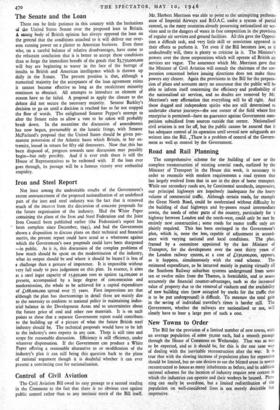Iron and Steel Report
Not least among the undesirable results of the Government's recent announcement of the proposed nationalisation of an undefined part of the iron and steel industry was the fact that it removed much of the interest from the discussion of concrete proposals for the future organisation of the industry. Had the White Paper containing the plans of the Iron and Steel Federation and the Joint Iron Council been published earlier (the Federation's report has been complete since December, 1945), and had the Government shown a disposition to discuss plans on their technical and financial merits, the present report could have acted as a whetstone against which the Government's own proposals could have been sharpened —in public. As it is, this discussion of the complex problems of how much should be spent on the modernisation of the industry, what its output should be and where it should be locatei is less of a challenge than a gesture of impotence. It is impossible without very full study to pass judgement on this plan. In essence, it aims at a steel ingot capacity of 15,950,000 tons as against 14,100,000 at present, accompanied by a large degree of concentration and modernisation, the whole to be achieved for a capital expenditure of £168,00o,000 spread over 71 years. First impressions are that although the plan has shortcomings in detail these are mainly due to the necessity to conform to national policy in maintaining indus- trial balance in the Development Areas and to uncertainties about the future price of coal and other raw materials. It is on such points as these that a separate Government report could contribute to the building up of a picture of what the future British steel industry should be. The technical proposals would have to be left to the industry's own experts in any case. There is still time and scope for reasonable discussion. Efficiency is still efficiency, under whatever dispensation. If the Government can produce a White Paper offering a reasonable alternative to or modification of the industry's plan it can still bring this question back to the plane of rational argument though it is doubtful whether it can ever present a convincing case for nationalisation.


























 Previous page
Previous page